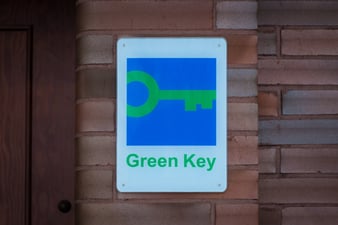Less single-use plastic? Energy-saving guestroom appliances? On-site composting?
“I think if you asked 100 different travelers to define what they mean by sustainable, they would probably give 100 different answers,” Jeremy Sampson, CEO of the global nonprofit The Travel Foundation, told HotelDive. 
Not only that, but hotel guests don’t necessarily believe the sustainability hype. While 74% of travelers surveyed for Booking.com’s Sustainable Travel Report 2023 said they wanted more sustainable choices, 39% didn’t trust that travel options labeled “sustainable” really are better for the environment.
Hotel sustainability certification programs are one way to build trust and make it easier for travelers to choose greener options. But which of these certifications is the right choice for your business — and what must a hotel do to earn one?
The new Green Key Global program
Since 1994, the Hotel Association of Canada (HAC) has operated the Green Key Eco-Rating Program to certify sustainable hotels in Canada. Now, the American Hotel & Lodging Association (AHLA) has joined forces with the HAC to create Green Key Global.
Green Key Global seeks to become the leading hotel sustainability certification program in North America. To join, member hotels pay an annual fee (just under $1,000 USD as of late 2023) and complete a questionnaire about their operations. Based on those results, a hotel receives a rating of 1 to 5 Green Keys, reflecting the environmental and social impacts of its operations. There’s also the Green Key Meetings program, which certifies meeting venues of any size based on ASTM/APEX 2021 green meeting standards.
It’s important to know that Green Key Global is not an enforcement agency. The organization does conduct inspections of about 20% of certified properties each year, seeking to verify that a hotel’s actual practices align with what it reports in the assessment. But Green Key Global certification primarily relies on self-reporting.
The Green Globe program
Green Globe measures hotel sustainability based on 44 core criteria, supported by over 380 compliance indicators. Unlike Green Key, the Green Globe certification requires independent verification. The organization arranges an on-site audit/inspection in a hotel’s first year of membership, then every 2 years after that. Rates for Green Globe certification range from $750 to $5,000 USD per year, based on the number of guestrooms a hotel has. Discounted corporate rates are available.
The EarthCheck program
EarthCheck describes itself as a “rigorous science-backed, people-focused certification process” for travel, hospitality and tourism companies. EarthCheck uses software to track member hotels’ performance in real time, monitoring energy use, water use, waste, carbon emissions and more. Once a sustainability management program is in place, EarthCheck sends an independent auditor to your property. A hotel that meets the requirements is awarded certification, which advances from Silver Certified to Gold, Platinum, then Master Certified over time.
“By being EarthCheck Certified, it proves what they’re doing isn’t a marketing ploy. It’s real. And they can use these externally audited figures in their corporate reporting frameworks, whether that’s an ESG report, a CSR report or a sustainability report,” Melinda Watt, EarthCheck’s Chief Scientist and Vice President Relationship Management, said of one global client. The cost of certification starts around $4,200 USD per year.
Global Sustainability Tourism Council (GSTC) Accredited Certification
For hotels that are just starting to implement sustainable practices, there’s another option. The GSTC has announced a collaboration with the World Travel & Tourism Council to offer a new pathway toward sustainability certification.
Start with Hotel Sustainability Basics: a simple set of 12 sustainability indicators “that all hotels should implement as a minimum.” These include measuring and reducing energy and water consumption, eliminating single-use water bottles, serving vegetarian menu options, etc. Then, a hotel can work toward achieving a more advanced certification.
While the GSTC doesn’t directly certify green hotels, it accredits certain Certification Bodies (CB): organizations that work with hotels to ensure compliance with GSTC requirements and issue sustainability certification.
Hotel sustainability practices — where should you begin?
Global hotel chains typically have ambitious, multi-year sustainability plans in place. If your hotel doesn’t have such a plan, it’s time to begin creating one.
- Start small. Don’t overwhelm your staff (or your budget) with sweeping changes. The Hotel Sustainability Basics program is a good first step.
- Measure your impact. The Sustainable Hospitality Alliance offers some useful free tools. The Hotel Carbon Measurement Initiative (HCMI) calculates the carbon footprint per occupied room on a daily basis and per area of meeting space on an hourly basis. The Hotel Water Management Initiative does the same for water usage.
- Get creative. Hotel sustainability practices can — and should — be innovative and even fun. Windjammer Landing Villa Beach Resort, a Green Globe member hotel, partnered with the Perry Institute for Marine Conservation to offer a special marine conservation package for divers. Guests can even sign up for a Lionfish Experience, “which includes the diving, hunting, cleaning, and cooking of lionfish, an invasive species.”
- Buy for the future. The greenest product is the one you don’t have to replace. Hamilton Beach Commercial products are built to last for years in the toughest conditions, from high-turnover guestrooms to high-volume kitchens.
Download our free eBooklet, A Case for Durability. For more good thinking in hospitality, see Hamilton Beach Commercial’s full line of products for guest rooms, extended-stay suites and breakfast bars.


